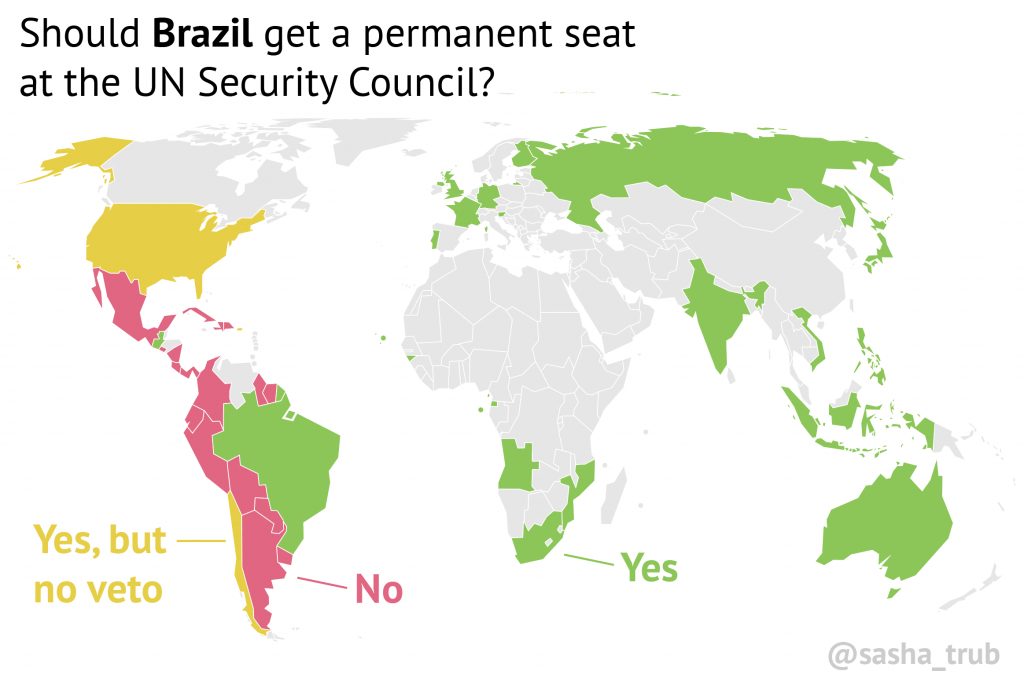
The United Nations Security Council (CSNU) plays a crucial role in maintaining international peace and security. However, many argue that its current structure does not reflect contemporary geopolitical reality and does not meet emerging global demands. In this context, it becomes crucial to discuss and implement a UN Security Council reform that not only expands the number of members, but also grant these new members veto power. This holistic approach is necessary to ensure the representativeness and effectiveness of this international body..
expansion of members: A reform of the UN Security Council that involves expanding the number of members is essential to reflect the current geopolitical reality. The council was established in 1945 with only five permanent members (China, U.S, France, United Kingdom and Russia) and ten other non-permanent members, totalizing 15 members. Since then, the world has undergone significant changes, with the emergence of new economic and political powers, like Brazil, the India, Germany and Japan. The inclusion of these countries as permanent members would increase the council’s representation, making it more legitimate and better reflecting the diversity of interests and perspectives in the current global scenario.
In addition to expanding the number of members, It is equally important to ensure that these new members have veto power in the Security Council. The veto power is an exclusive prerogative of permanent members, allowing them to block any resolution they consider contrary to their interests. However, This unequal distribution of power creates a significant imbalance, limiting the Council's ability to respond to contemporary crises and challenges. By granting veto power to new permanent members, reform of the UN Security Council would promote equality and justice in international relations, ensuring that voices from different parts of the world are heard and considered in board deliberations and decisions.
Effectiveness and legitimacy: Reform of the UN Security Council, by expanding the number of members and granting veto power to these new members, would increase the effectiveness and legitimacy of decisions taken by the body. More equitable representation on the board would ensure that a broader range of perspectives and interests are considered during deliberations, making resolutions more comprehensive and well-founded. Besides that, This reform would reduce the perception that the UNSC is a body dominated by a few powers and would strengthen its credibility before the international community.
Brazilian participation in the United Nations (HIM-HER-IT) e, especially, in the Security Council is of paramount importance to promote a truly multipolar world. Brazil is recognized as a country with regional and global influence, presenting a robust economy, a rich cultural diversity and a history of constructive diplomatic engagement.
As the largest nation in Latin America, Brazil plays a fundamental role in the search for peaceful solutions to regional conflicts and in defending the interests of developing countries. Their active and committed participation in the UN has the potential to strengthen the representation of these countries on the international stage, contributing to a more balanced and inclusive global system.
The Brazilian presence on the UN Security Council would bring significant benefits to the promotion of international peace and security. Brazil has a long tradition of multilateral diplomacy, defense of dialogue and peaceful resolution of conflicts. These principles are fundamental to building a more stable and harmonious world. By occupying a prominent position on the Security Council, Brazil could use its expertise in mediation and consensus building to seek peaceful solutions to conflicts in different regions of the world.
Besides that, Brazilian participation in the Security Council would be an important step towards a more equitable and representative international system. Brazil is one of the largest democracies in the world and has stood out as a defender of the rules-based international order and multilateralism. Its presence on the Security Council would be an example of how an emerging power can contribute to global decision-making and influence the international agenda in a positive way..
By promoting a truly multipolar world, Brazilian participation in the Security Council would contribute to strengthening the legitimacy and effectiveness of UN actions. This is because it would represent an opportunity to incorporate the perspectives and interests of developing countries, who are often underrepresented in international decision-making bodies. With a greater diversity of voices and visions, the Security Council would be better able to address global challenges in a comprehensive and fair manner.
In conclusion, Brazilian participation in the UN Security Council plays a fundamental role in the search for a truly multipolar world. Brazil, as a regional and global power, has the necessary resources and expertise to contribute significantly to the promotion of peace, security and sustainable development. Their presence on the Security Council would strengthen the representation of developing countries and help build a more equitable international system, inclusive and effective.
